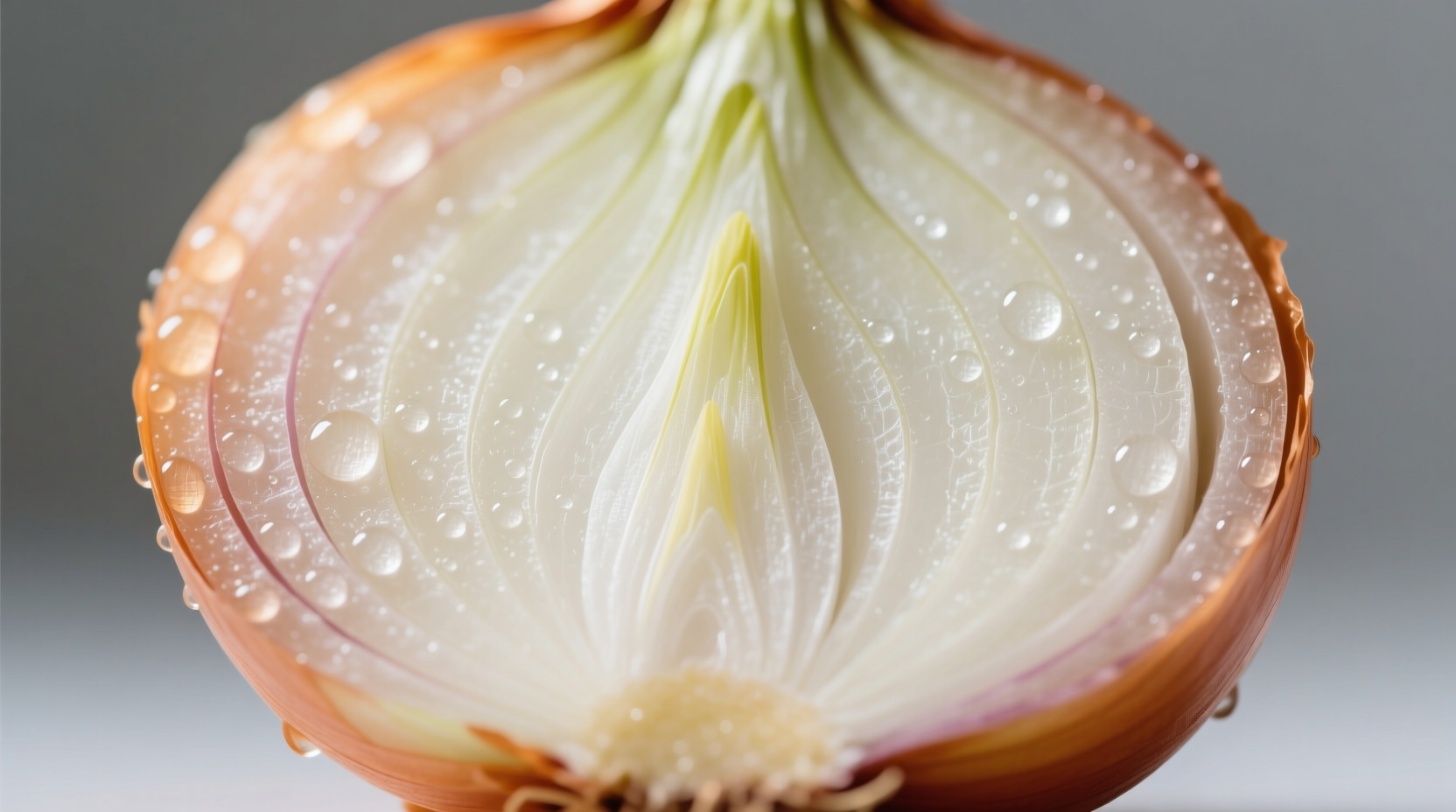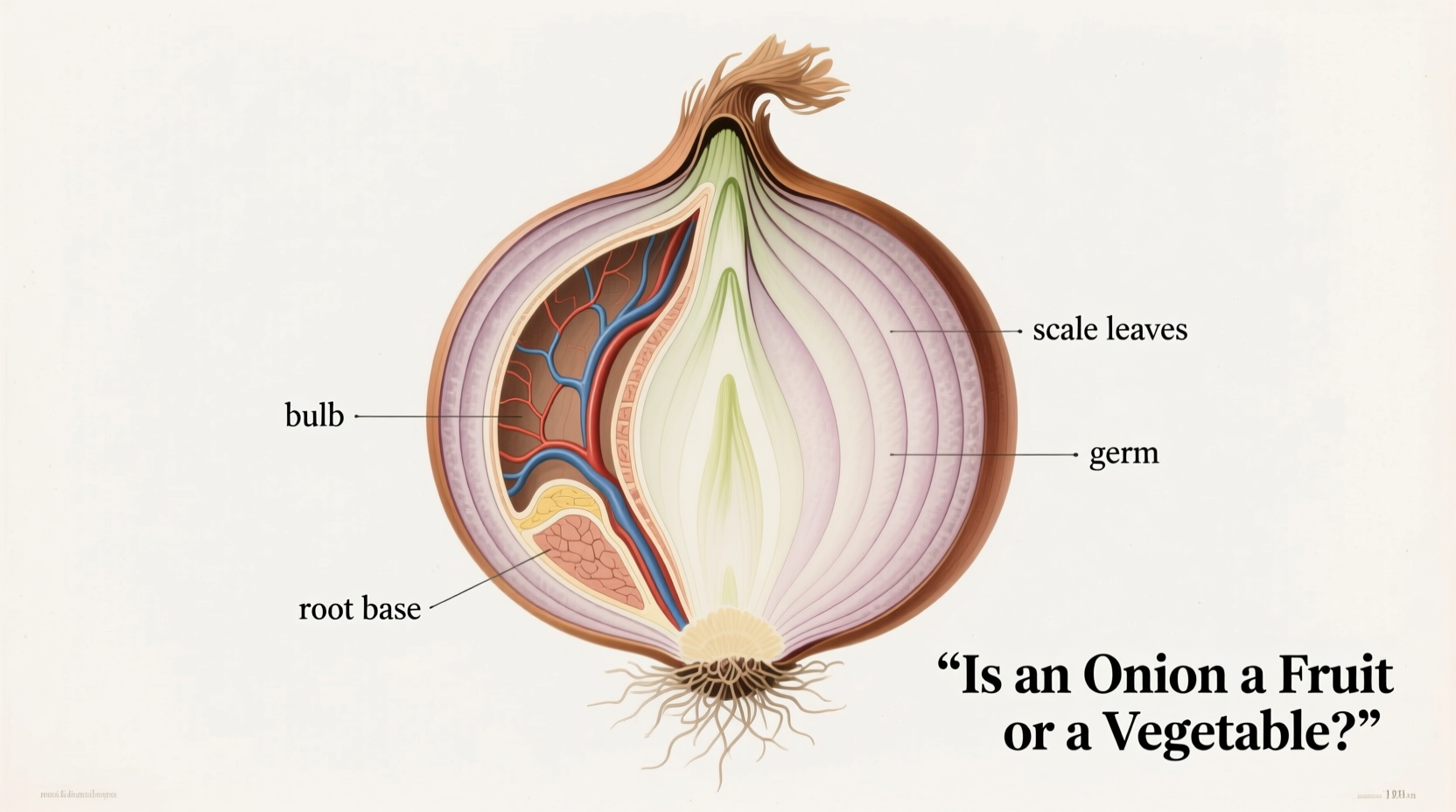Why This Classification Confuses So Many Cooks
If you've ever wondered is an onion a fruit or a vegetable, you're not alone. This common kitchen confusion stems from the gap between scientific botany and culinary tradition. While tomatoes and cucumbers are technically fruits but treated as vegetables in cooking, onions occupy a different category entirely. Understanding this distinction helps you make better decisions in meal planning, substitutions, and even gardening.
The Botanical Reality: What Makes a Fruit vs. Vegetable
Botanists define fruits as the mature ovary of a flowering plant, typically containing seeds. Think apples, oranges, or even tomatoes—all develop from flowers and house seeds. Vegetables, conversely, refer to other plant parts: roots (carrots), stems (celery), leaves (spinach), and bulbs (onions).
Onions grow as underground storage organs called bulbs, composed of modified leaves surrounding a small stem. They reproduce through these bulbs rather than seeds contained within a ripened ovary. This fundamental biological difference places onions firmly in the vegetable category from a scientific perspective.
| Classification Type | Fruit Characteristics | Vegetable Characteristics |
|---|---|---|
| Botanical Definition | Ripened flower ovary containing seeds | Edible plant parts excluding fruits |
| Onion's Structure | Does not develop from flower ovary | Bulb formed from modified leaves |
| Reproduction Method | Primarily through seeds | Through bulb division or seed (secondary) |
| Common Examples | Tomatoes, cucumbers, peppers | Onions, carrots, broccoli, potatoes |
Culinary Context: Why Chefs Treat Onions as Vegetables
In the kitchen, classification follows usage rather than strict botany. Chefs categorize foods by flavor profile, cooking behavior, and traditional pairings. Onions:
- Provide savory base notes rather than sweet flavors
- Are used in savory dishes rather than desserts
- Pair with other vegetables in cooking techniques
- Contribute umami and aromatic qualities typical of vegetables
This culinary classification explains why is an onion a vegetable remains the practical answer for home cooks and professional chefs alike, despite the botanical precision.
Practical Kitchen Implications of Proper Classification
Knowing onions are vegetables affects your cooking in tangible ways:
Substitution Guidance
When replacing onions in recipes, choose other vegetables with similar properties—shallots, leeks, or fennel—rather than fruits. Substituting with fruits would dramatically alter flavor profiles and cooking chemistry.
Nutritional Understanding
Onions deliver vegetable-specific nutrients: high in vitamin C and B vitamins, with beneficial sulfur compounds. Unlike fruits, they contain minimal natural sugars, making them suitable for low-sugar diets. The USDA's National Nutrient Database confirms onions' nutritional profile aligns with other allium vegetables rather than fruits.
Cooking Technique Optimization
Understanding onions' vegetable nature explains why they:
- Caramelize through the Maillard reaction (not fruit sugar caramelization)
- Require different cooking times than fruits
- Pair well with other vegetables in mirepoix and sofrito bases

Debunking Common Onion Classification Myths
"But onions make me cry like fruits do!" - The lachrymatory effect comes from sulfur compounds released when cutting, not fruit enzymes. This characteristic actually reinforces their vegetable classification.
"Aren't tomatoes fruits, so why not onions?" - Tomatoes develop from flower ovaries containing seeds, meeting the botanical fruit definition. Onions grow as storage bulbs—fundamentally different plant structures.
"What about green onions vs. regular onions?" - Both are the same species (Allium cepa). Green onions simply represent the immature plant, but both classifications remain vegetable by botanical and culinary standards.
When Classification Matters (and When It Doesn't)
For most home cooking, whether is an onion a fruit or a vegetable matters little—what counts is how you use it. However, this distinction becomes crucial when:
- Gardening: Onion bulbs require different planting techniques than fruiting plants
- Nutrition planning: Understanding carbohydrate composition for dietary needs
- Food science applications: Different chemical behaviors during cooking
- Botanical studies: Accurate plant classification systems
For everyday cooking, focus on onions' culinary role as a foundational vegetable that builds flavor in countless dishes worldwide.
Frequently Asked Questions
Are onions technically fruits?
No, onions are not fruits. Botanically, fruits develop from the ovary of a flowering plant and contain seeds. Onions are bulbs—modified underground leaves that store nutrients—making them vegetables by scientific classification.
Why do people confuse onions with fruits?
This confusion often stems from similar misunderstandings about tomatoes and cucumbers (which are botanically fruits). Unlike those examples, onions don't develop from flower ovaries or contain seeds in their edible portion, placing them firmly in the vegetable category both botanically and culinarily.
Is there any part of the onion plant that's a fruit?
Yes, but not the part we eat. Onion plants produce flowers that develop seed pods—these seed pods would be considered fruits botanically. However, the bulb we consume as food remains a vegetable. Most commercial onions are harvested before flowering to maximize bulb size.
How does onion classification affect cooking?
Understanding onions as vegetables helps you apply proper cooking techniques. Unlike fruits, onions caramelize through the Maillard reaction rather than sugar caramelization, require different cooking times, and pair best with other vegetables in flavor bases. This knowledge improves substitution choices and recipe adaptation.











 浙公网安备
33010002000092号
浙公网安备
33010002000092号 浙B2-20120091-4
浙B2-20120091-4